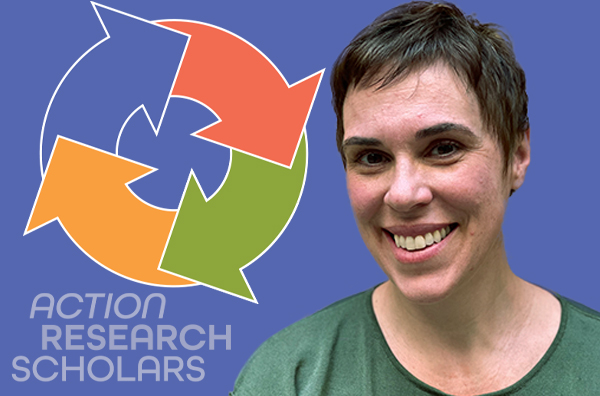Charitianne Williams
English, College of Liberal Arts and Sciences & UIC Writing Center
Charitianne Williams
Charitianne Williams
Charitianne Williams is a Senior Lecturer in the UIC English Department and an Assistant Director at the UIC Writing Center. She has been teaching academic writing at UIC since 2004. She specializes in multilingual composition instruction and writing center theory. Her recent research interests emerge from this background — specifically a belief that knowledge construction is inherently diverse, dependent upon reciprocity, and best situated in the immediacy of human relationships and communication.
Williams is a 2022-23 Action Research Scholar.
Charitianne Williams

Charitianne Williams
A Threshold Crossing Inventory for Writing-Intensive Classrooms
Abstract
In response to a lack of tools for formative and confirmative assessment of students’ writerly knowledge, this study uses survey, interview, and writing sample data to develop a Threshold Concept Inventory that can be used to describe student gains in fundamental concepts about writing and literacy.
meat
Project Background and Rationale
1
This study seeks to develop tools for both formative and confirmative assessment of student acquisition of threshold concepts. Fundamental to the project is Meyer, Land, & Davies (2008) discussion of a Subliminal to Post-Liminal framework that describes characteristics of 4 stages of threshold crossing. This project seeks to develop a tool similar to other learning diagnostics that can identify a student’s progress towards threshold crossing, using the framework, in order to both tailor curriculum and assess learner growth. Currently no widespread diagnostic tool assessing threshold crossing is identifiable in the research of writing, although there is extensive work on fostering and identifying threshold crossing in other disciplines.
The first phase of the project specifically targeted classes that utilize translingual pedagogy. Assessment in classes using translingual writing can be difficult since the final writing product is purposefully combining multiple styles and languages, some of which may not be known to the grader. Also, within translingual pedagogy, standards for assessment, especially those that focus on the production of an “ideal” final written product are suspect, and potentially violate fundamental premises of the theory. A need for more diverse and less product-based evaluation of student gains made as a result of instruction are sorely needed.
2
The second phase targeted First-Year Writing Students in a purely quantitative study of the inventory itself; the third phase will combine both qualitative and quantitative data to fine-tune and validate the inventory tool.
Threshold concepts provide an avenue to assess student knowledge about writing, as opposed to student writing, in a holistic way that potentially separates assessment from subjective influences such as disciplinary background, language background, and social perceptions of correctness which carry with them questions about marginalization and disenfranchisement.
Questions Investigated
How do I communicate gains in translingual writing to students and instructors who may be unfamiliar with the field and perhaps even resistant to the idea of code-meshing in writing?
What writerly practices demonstrate understanding of threshold concepts in writing?
Findings
At this point, findings center on the revision and validation of the inventory. Data has led to a shift away from concepts towards demonstrable practices associated with conceptual understanding.
Dissemination and Impact
At the moment, I would consider this project as moving forward, as opposed to having reached the stage where it is having an impact. The study has been accepted for presentation at the Conference for College Composition and Communication in April, a highly competitive conference in the field of college composition.
Implications
Overall, this project has turned into a larger and more sustained endeavor than originally planned. The introduction of AI-generated writing has revealed a new area where assessment of student knowledge about writing separate from their written texts themselves is useful to instructors, mentors, and students. Once the inventory is validated, I would like to build another project using the inventory to investigate student gains in knowledge about writing as a result of writing courses utilizing different pedagogies and writing standards.
References
Adler-Kassner, Linda, and Elizabeth A. Wardle. Naming What We Know : Threshold Concepts of Writing Studies. Edited by Linda Adler-Kassner and Elizabeth A. Wardle, Utah State University Press, 2015.
Adler-Kassner, Linda, and Elizabeth Wardle. (Re)Considering What We Know: Learning Thresholds in Writing, Composition, Rhetoric, and Literacy. University Press of Colorado, 2020.
Brown, Tessa. “What Else Do We Know? Translingualism and the History of SRTOL as Threshold Concepts in Our Field.” College Composition and Communication, vol. 71, no. 4, 2020, pp. 591–619.
Land, Ray, et al. Threshold Concepts within the Disciplines. Sense Publishers, 2008.
Mokhtari, Kouider, et al. “Revising the Metacognitive Awareness of Reading Strategies Inventory (MARSI) and Testing for Factorial Invariance.” Studies in Second Language Learning and Teaching, vol. 8, no. 2, 2018, pp. 219–246, https://doi.org/10.14746/ssllt.2018.8.2.3.